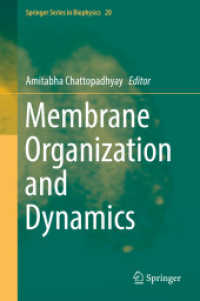- ホーム
- > 洋書
- > ドイツ書
- > Humanities, Arts & Music
- > Philosophy
Full Description
Re-thinking the Angelic Doctor is a major new reassessment of the reception of Thomas Aquinas in the work of the twentieth-century American philosopher W. Norris Clarke. Author Aloysius N. Ezeoba explores the question of whether Clarke was engaged in a "creative retrieval" of Aquinas' system of thought - with a focus on the human person - or whether Clarke was forging his own path in attemptting to provide a "creative completion". Shedding new light on the workings of two great minds separated by eight centuries, Re-thinking the Angelic Doctor will be of interest to readers who are looking for a timely re-examination of the Aristotelian arguments, especially as they are appropriated by template religious thinkers such as Aquinas. It will also be a valuable resource in graduate courses in medieval and modern philosophy and theology.
Readers concerned with understanding how to appropriate St. Thomas Aquinas's thinking for the twenty-first century will be greatly assisted in this task by reflecting upon this volume. They will learn much about the last century's attempts to rethink St. Thomas from the varied positions of neo-Thomists in movements such as Transcendental and Existential Thomism. They will understand the ways in which thinkers such as Marechal and Phelan, were recrafting or, perhaps, abandoning classical Thomism, and how contemporary thinkers, such as Rev. Christopher Cullen, S.J. were countering with arguments defending traditional Thomism. And, importantly, they will confront the thought of one important figure connected with this appropriation: Rev. Norris W. Clarke, S.J., with whom I had contact in many ways as a fellow faculty member and as a popular lecturer. This book is an analytically precise, thoughtful, fruitful exercise in philosophy. It renders appropriate homage to that important twentieth-century Jesuit philosopher and teacher, and prepares the ground for critical appraisal of other various creative appropriations of St. Thomas Aquinas in the past century.
—William P. Baumgarth, Sr., PhD, Associate Professor of Political Philosophy, Fordham University.
Contents
Foreword - Introduction - Human Person as Substance - The Human Person in Clarke is a Dynamic Substance Rooted in Esse - Human Substance in Aquinas' vis-à-vis Clarke's - Clarke's Problem with The Human Substance Among Some Modern and Contemporary Thinkers - New Notion of Substance as Intrinsically Dynamic - Human Person as Relation - Clarke's Theory of Relation in Aquinas - The Origin of The Primordial Notion of Relations - Developed Primordial Relations Among Contemporary Thinkers - Clarke and Contentious Problems of Person as Relation in the Contemporary Thought - Human Person as Substance-in-Relation - Clarke's Notion of Person - Reason for Relation (agere) - The Ontological Orientation of the Human Person - Transcendental Method - Aquinas' Root of Clarke's Thought and Relational Problem - Substance-in-relation: Creative Retrieval or Completion of Aquinas' Thought? - Relational Problem, Dangers, and Proposal - Proposal for the Development of the Primordial Relation in esse - Conclusion - Bibliography - Index.








